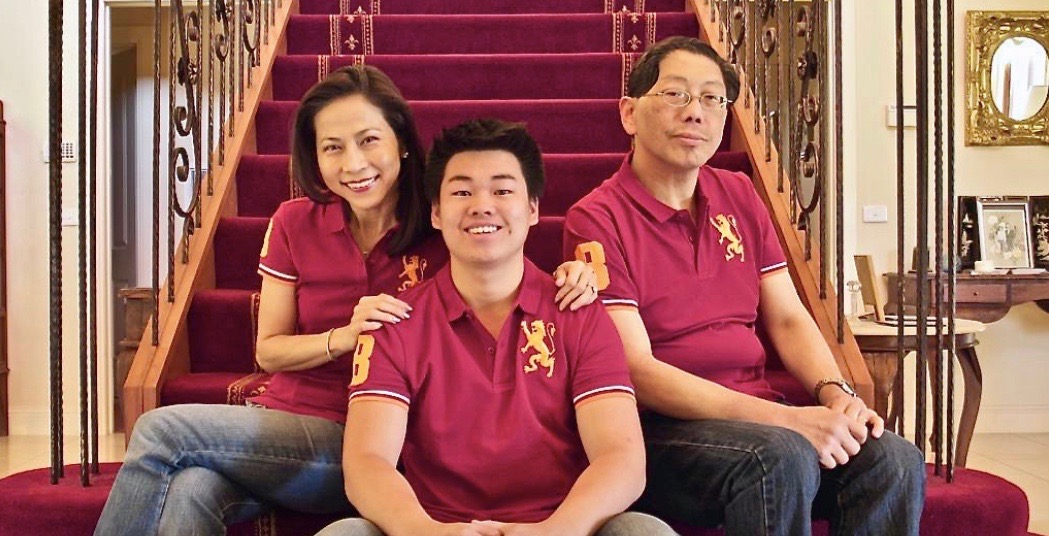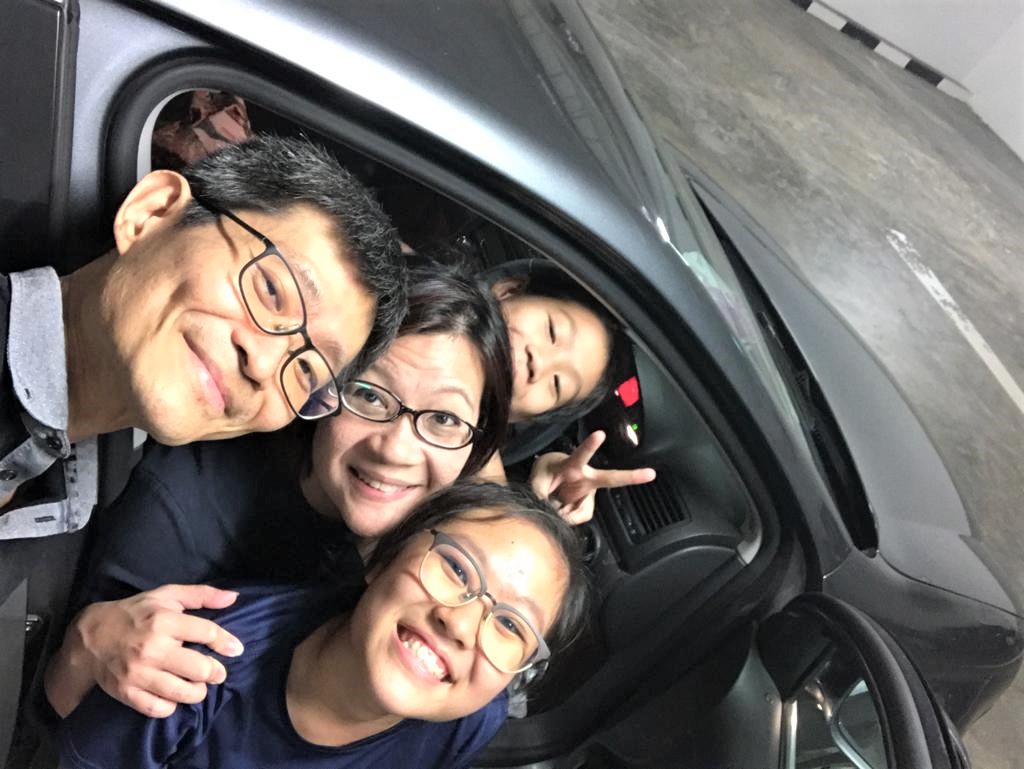“What if daddy dies?” How to help children whose parents have cancer
by Christine Leow // March 24, 2021, 4:13 pm

(Left to right) Ashley Moriah Low, son Lennard, and Tony Peter Low. When Tony Peter was diagnosed with multiple cancers, Lennard was not even a year old. Photo courtesy of Ashley Moriah Low.
When Tony Peter Low, 62, began his 10-year battle with various cancers – nose, eye, lymph nodes and various parts of his bone – his son, Lennard, was only nine months old.
“Our son grew up with a father who always went to the hospital for chemo, radiation. He grew up with a father always sleeping on the bed,” said Tony’s wife, Ashley Moriah, 59.
Lennard, now 23 and recently married, was not told of his father’s illness till he was 12.
“Our son grew up with a father who always went to the hospital for chemo, radiation.”
“We never sat down to tell him because he was too young to understand and we didn’t want him to have trauma,” said Ashley.
“At 12, he was more mature and able to understand. By then, he already knew dad was sick but didn’t know that the cancer was terminal. When we eventually told him, he acknowledged it.”
Parents with cancer often struggle to manage not just their illness but also their children’s reaction to it.
Salt&Light talked to families, counsellors and cancer support groups to find out how to help children living with parents who have cancer.
1. Take time to settle your emotions first
Even before deciding whether to tell the children, come to terms with your own emotions first, advise parents who are cancer survivors. Unsettled negativity, even if never articulated, can affect the whole family.
“Kids take the cue from the parents. If parents are fearful, the kids are likely to be, too,” said Carl Tan, cancer survivor and person in charge of Faith Methodist Church’s cancer support group.
Tan was diagnosed with lung cancer, not once, but twice. The first time, he was 37 years old. The cancer was detected early and successfully removed in surgery.
“I’m a pharmacist by training. Because of my medical background, the news didn’t hit me so badly. I felt that everyone needed to be part of the statistics.”
Parents with cancer often struggle to manage not just their illness but also their children’s reaction to it.
Because he took his diagnosis well, his only child was not affected much either.
When Tan’s cancer returned when he was 50, he was shaken.
“Sometimes it’s harder for a Christian going through cancer. Because you believe in a sovereign God, you start to question a bit, ‘Why is it happening to me? Is it punishment from God? Is it a Job moment when you’re just being tested?’”
Not having a clear answer to his questions sent him on a downward spiral into depression that lasted nine months.
His daughter was 18 by then. “She was scared the second time, but not immobilised.”
As both a cancer survivor and a counsellor and psychotherapist at Allianz Care LLP, Grace Phoon appreciates the importance of parents setting the tone.
In 2013, she was diagnosed with liposarcoma, a rare cancer of the connective tissues. Hers was considered Stage 4 because the cancer was in the liver, pancreas, gall bladder and spleen.
Her children were then 13, 14 and 21.
“Even if they are afraid, they won’t tell you and they end up suffering alone.”
“I was very calm. I just told them that I had cancer and I would be going for surgery. Deep down I just felt I would be okay. I gave them the assurance and told them, ‘You don’t have to be worried’.
“When you are talking to your child, if you are very nervous and anxious, this might really impact the children and they will feel very helpless. So, even if they are afraid, they won’t tell you and they end up suffering alone.”
For Phoon, that initial calm and faith would become a blessing later.
“After the surgery, my faith was a bit shaken. That was the irony. Before that, I was so strong.”
Reading about a 1 in 5 survival rate past five years caused her to go into depression. “It affected me very badly.”
Two weeks into the depression, her youngest son came to her and said: “You keep telling me you have faith, you believe you are healed. Why are you reading about the cancer online? Just believe you are healed.”
That stopped her in her tracks. It has been eight years since her diagnosis.
2. Be honest with your child
When Maybeline Tay’s husband, Benson Chia, found out he had nasopharyngeal cancer, husband and wife chose to tell the children.
That year, the family had come up with a family motto: Whatever it is, we will work together as a family and we will trust that God will take care of us.
“Because of the family motto, we felt we would journey together through Benson’s illness,” said Tay.

(Left to right) Benson, Maybeline, Kenan and Anya. The children were just nine and 11 when Benson was diagnosed with cancer. Photo courtesy of the Chias.
So, throughout the six-year battle with cancer, their children aged 12 and 10 when they were first told, were kept informed about every scan and every treatment.
Counsellor Grace Phoon believes the age of the child matters. She advised that unless the cancer is terminal, children under the age of seven should not be told.
“The stage of the cancer also affects. If survival rate is high, we don’t want to burden the kids if they are very young.”
“Children should be given truthful information and opportunities to engage in authentic conversations to address fears.”
Focus on the Family Singapore’s principal counsellor, Alicia Boo, agreed to an age-appropriate approach.
“Broadly speaking, pre-primary children do not need a lot of in-depth information while older children and teens do.”
Tan did not tell his daughter when he was diagnosed with lung cancer the first time around because she was only three years old.
“When she was old enough to understand, when she started primary school, we told her.”
Boo believed it is important that children are included because it makes them feel valued and helps to maintain trust in the parent-child relationship.
She added: “Children often equate cancer with death. They may not be talking or asking about it, but they are almost certainly thinking about it and feeling worried.
“When parents are vulnerable in personal disclosure, children tend to mirror it and let down their guard, too.”
“Children should be given truthful information and opportunities to engage in authentic conversations with their parents to address their fear and to cope well.
“When parents are vulnerable in personal disclosure, children tend to mirror it and let down their guard, too. The main message should be: Regardless of what happens, they will always be cared for.”
This was Phoon’s experience when she broke the news of her cancer to her children.
“They were in shock initially. There are too many TV shows that say cancer means death. I had to talk to them about that, that it is okay.
“Faith was very important in the journey for my husband and me. There was nothing that we could do but just trust God.”
The way in which the children are told is important, too. Boo shared these steps:
- Be prepared
Practise or write down what you want to say.
- Be safe
Have the conversation in a safe place where the children are comfortable. Including your spouse or other trusted family members can make it easier for them as well.
- Be aware of non-verbal communication
Studies have shown that 38% of communication is conveyed through the tone of voice, and 55% in body language, gestures and facial expressions. Non-verbal cues speak volumes. Maintain a grounded and encouraging tone but do not be afraid of showing authentic emotions. A parent expressing sadness can also show children that it is alright to feel the same.
- Be clear
With really young children, it is important to use the word “cancer” right from the start and explain to them what it means. Assure them that they did not cause it nor can they control it, and that it is not contagious. Use common and familiar words. They are easier to understand.
- Be comforting
Tell them quality family time is still possible as are fun times, though they might be done differently.
- Be brief
Children have a short attention span. The younger they are, the shorter the conversation should be.
- Be informative
Share treatment plans. For young children, talking about “bad cells” that can be removed (surgery), blasted (radiotherapy) or killed (chemotherapy) can help them to understand what is going on. Giving them a heads up about the effects of some the treatments – “Daddy will be very tired” or “Mummy may lose her hair” – can make them more receptive when the time comes.
3. Protect them from the worst
While informing and including the children are encouraged, Phoon believes that parents need to exercise some caution. The image of a parent weak and vulnerable in a hospital can be traumatic for a young child.
When Ashley Moriah’s husband Tony Peter was in the hospital “in a coma with 12 tubes”, their son was only nine years old. She sent him to a church camp so that he did not see his father at his worst.
“When he came back from the camp, Tony had only one tube from the bladder.”
4. Maintain as much normalcy as possible
A serious illness can drastically affect the family. To help children feel a small sense of control and be involved, Boo said, it is alright to include the children in daily activities which parents may now need help with.
It is alright to include the children in daily activities which parents may now need help with.
Even as life changes, try to maintain some of the old routines.
“Let the child know it’s alright to still enjoy himself or herself. It’s important to also maintain the parent-child relationship such as reading together at night.
“Take time to unwind with the children – chat about their hobbies, school life, friends. Help them feel free to talk about fun things besides cancer. Enjoy each other’s company,” said Boo.
This was what the Chias – Benson and Maybeline – tried to do. Benson would do Bible study with the children, and every night his son would go to him for father-and-son prayer time.
“Ben never let his illness stop the kids from doing anything differently. The greatest adjustment was the diet as we all started to eat very healthily,” said Maybeline.
5. Answer their questions
Be prepared for questions. Thinking of the answers ahead may help.
According to Boo, children tend to think in concrete terms. So, they like to know what is going on and what to expect.
“If there’s a question you don’t know the answer to, it’s okay to say you don’t know but you will do your best to figure it out, and include them in the processing.”
“What if God decided that he wants daddy to go back to heaven?”
That was what Maybeline did when her children asked her if there was a God and why He was not healing their father.
“We say we don’t know. We are very open. My husband had great faith that God would heal him. I told them I didn’t know when but we just had to journey with the Lord.”
When her son was in primary school, he asked: “What if God decided that he wants daddy to go back to heaven?”
Said Maybeline: “I said that when that happens, God will take care of us.”
6. Live in faith but journey honestly
After a 10-year struggle with multiple cancers and a return-from-the-dead experience, Tony Peter managed to beat the disease. He and his wife Ashley Moriah then spent the next years sharing their story at over 100 churches in Australia, Malaysia and Singapore.
When Tony Peter suffered a relapse in 2015, Ashley Moriah was understandably distraught.
“I was the one upset, angry. How can this happen? How can I stand up and say God healed my husband now that there was a relapse? I was struggling with that for quite a while.”
The years listening to his parents talk about their faith made a difference to their son Lennard’s response.
Said Ashley Moriah: “I thought my son would be affected but he said, ‘Even when dad was pronounced dead, God woke him up. Don’t worry.’”
There is room, however, for letting your children see your real struggles. When Maybeline’s husband passed away last November after a six-year fight against cancer, the family grieved.
““It is important for the child to be able to express any unfinished business.”
“Every now and then, I will tell my children, ‘Mummy really misses daddy.’ They will turn around and say, ‘We know.’
“My daughter said she didn’t want to let me know how she felt because I’m not coping. But I said, ‘Let me know, so we can cope together.’ I want to be as authentic with them as possible.”
Phoon believes such honesty can help the grieving process.
“If a parent is dying, be honest about it. Help them say goodbye. Conversations would be the most ideal. If the parent is unconscious, record something.
“It is important for the child to be able to express any unfinished business. It can be painful. Yet at the same time it brings a sense of peace.”
7. Watch for reactions
These are common signs parents can look out for that signal that a child may need help coping, according to Boo:
- Sustained display of sadness (not laughing as much or expressing joy)
- Being socially withdrawn (from friends and family)
- Changes in appetite, either increased or decreased
- Reduced interest in activities they previously enjoyed
- Low energy
- Changes in sleep patterns, that is, either sleeplessness or excessively sleeping
“If the child doesn’t want to talk or seems withdrawn, don’t assume that they don’t care or aren’t interested.
“They’re probably internalising their feelings and may just need some more time to process. Reassure the child that you’re still the parent and that you love them,” said Boo.
If they have trouble articulating their thoughts and feelings, using other mediums may help. Children can draw what is on their minds. They can journal their thoughts. There are even games they can play with their parents to help them process their emotions.
If the out-of-character behaviours become habitual, professional help might be necessary.
8. Get support
As the cancer journey is a long one, Boo suggests regular family meetings to work out changes in family routine that will now include hospital appointments and treatment cycles.
This will help parents to identify gaps for support – relatives, friends, church community – to come in.
This can come in the form of asking for practical help such as coaching the children in their homework – ferrying them to and from school, tuition or co-curricular activities, preparing home-cooked meals, or taking the children out to eat.
Said Boo: “Build a support network by informing the school as well, so teachers can look out for signs that your child is not coping well outside of the home.”
The Chia children have a strong support system. Teachers were aware that their father had cancer. School friends rallied around them.
“When God calls you, He also equips you.”
Cancer support groups can help, too. Tony Peter and Ashley Moriah started one in 2015 just before Tony Peter’s relapse.
The Inspired group began as a place where Christians with cancer as well as their caregivers could pray and share their cancer experiences for mutual support.
The Chias were part of the group and, when Benson passed away, the women in the group came alongside the family. On the Chias’ 20th wedding anniversary less than a month after Benson passed away, the women took the family out for a nice meal.
The Chias themselves also pioneered a cancer support group in their church called Life Fellowship.
This year, Ashley Moriah hopes to move Inspired into the area of helping the children in the families as well.
Amongst the children she is journeying with is a pair of teenaged twins whose parents had been with Inspired for six years.
When their father passed away, the twins became angry, violent and suicidal. They refused to talk to anyone, but opened up to Ashley Moriah.
“The Lord opened up (the conversation) and made it so easy for me. When God calls you, He also equips you.”
The gifts in the valley: How God shepherded a pastor’s soul after his wife died
“I am a dead man walking”: He was pronounced dead by four doctors
We are an independent, non-profit organisation that relies on the generosity of our readers, such as yourself, to continue serving the kingdom. Every dollar donated goes directly back into our editorial coverage.
Would you consider partnering with us in our kingdom work by supporting us financially, either as a one-off donation, or a recurring pledge?
Support Salt&Light


